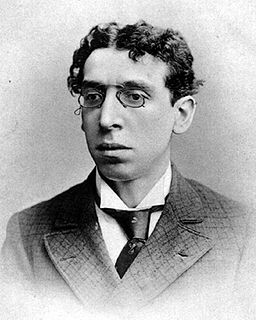A Quote by B. C. Forbes
The human being who lives only for himself finally reaps nothing but unhappiness. Selfishness corrodes. Unselfishness ennobles, satisfies.
Quote Topics
Related Quotes
Selfishness is not living as one wishes to live; it is asking others to live as one wishes to live. And unselfishness is letting other people's lives alone, not interfering with them. Selfishness always aims at uniformity of type. Unselfishness recognizes infinite variety of type as a delightful thing, accepts it, acquiesces in it, enjoys it.
The difference between God and the devil is in nothing except in unselfishness and selfishness. The devil knows as much as God, is as powerful as God; only he has no holiness that makes him a devil. Apply the same idea to the modern world: excess of knowledge and power, without holiness, makes human beings devils.
An artist is he who has his center within himself. He who lacks this must choose a particular leader and mediator outside of himself, not forever, however, but only at first. For man cannot exist without a living center, and if he does not have it within himself, he may seek it only in a human being. Only a human being and his center can stimulate and awaken that of another.
For one thing is needful: that a human being should attain satisfaction with himself, whether it be by means of this or that poetry or art; only then is a human being at all tolerable to behold. Whoever is dissatisfied with himself is constantly ready for revenge, and we others will be his victims, if only by having to endure his ugly sight.
Philosophy... is indeed outrageous, inherently so. It seeks to disquiet the foundations of our lives and to offer us in recompense nothing better than itself- and this on the basis of no expert knowledge, of nothing closed to the ordinary human being, once... [one] lets himself or herself be informed by the process and ambition of philosophy.
I did not believe him capable of love. That is an emotion in which tenderness is an essential part, but Strickland had no tenderness either for himself or for others; there is in love a sense of weakness, a desire to protect, an eagerness to do good and to give pleasure--if not unselfishness, at all events a selfishness which marvellously conceals itself; it has in it a certain diffidence.
...being human always points, and is directed, to something, or someone, other than oneself—be it meaning to fulfill or another human being to encounter. The more one forgets himself—by giving himself to a cause to serve or another person to love—the more human he is and the more he actualizes himself.... What is called self-actualization is not an attainable aim at all, for the simple reason that the more one would strive for it, the more he would miss it. In other words, self-actualization is possible only as a side-effect of self-transcendence.
Remember one thing: the one who brings unhappiness to others in the end becomes unhappy himself, and the one who brings happiness to others in the end reaches to the heights of happiness. That's why I am saying that someone who tries to give happiness develops the center of happiness inside himself, and someone who tries to bring unhappiness to others develops the center of unhappiness inside himself.
































